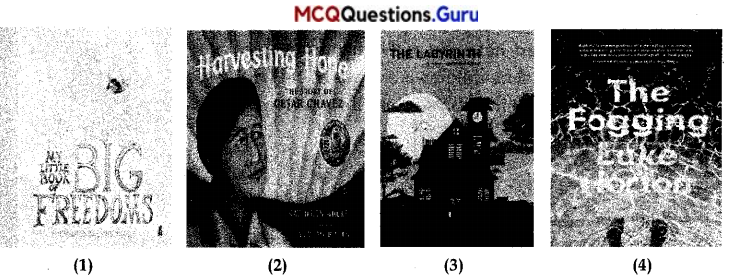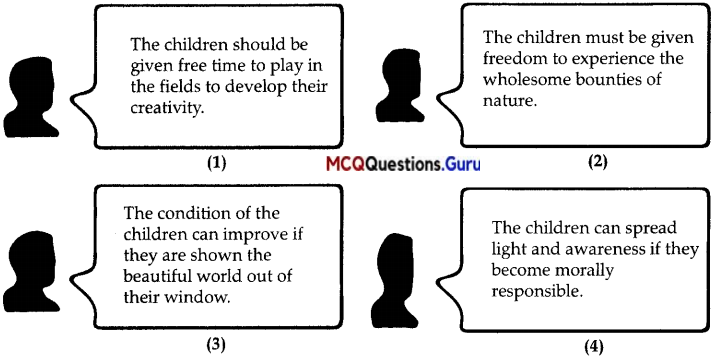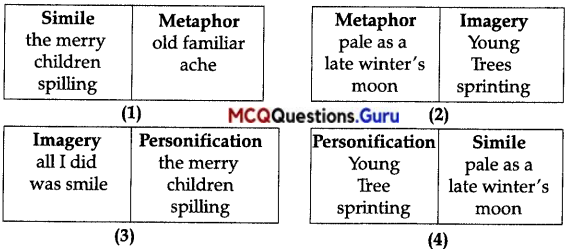Check the below NCERT MCQ Questions for Class 12 English Flamingo Poem 5 A Roadside Stand with Answers Pdf free download. MCQ Questions for Class 12 English with Answers were prepared based on the latest exam pattern. We have provided A Roadside Stand Class 12 English MCQs Questions with Answers to help students understand the concept very well. You can also practice NCERT Solutions for Class 12 English on LearnInsta.com. https://mcqquestions.guru/a-roadside-stand-class-12-mcq-questions/
MCQ Questions for Class 12 English Flamingo Poem 5 A Roadside Stand with Answers
A Roadside Stand MCQ Poem 5 Class 12 Question 1.
What does the speaker or narrator call the thought of the owner of the stand?
(a) A chid like longing
(b) a very good thought
(c) a wise thought
(d) A childish longing in vain
Answer
Answer: (d) A childish longing in vain
A Roadside Stand MCQ Questions Class 12 Question 2.
What would be the state of poor rural folk at new location ?
(a) tension free as their needs will be looked after
(b) they will be able to visit city malls
(c) they will enjoy travelling malls and cinema halls
(d) they will be happy
Answer
Answer: (a) tension free as their needs will be looked after
Roadside Stand MCQ Poem 5 Class 12 Question 3.
What was the news?
(a) City people will give money
(b) city people will help the poor
(c) Relocation and resettlement of the rural folk to make them tension free by the government
(d) None
Answer
Answer: (c) Relocation and resettlement of the rural folk to make them tension free by the government
MCQ Of A Roadside Stand Poem 5 Question 4.
Who wanted to feel the money at hand and from whom?
(a) The rural folk from the government
(b) The rural folk from the social agencies
(c) The rural folk from the government officials
(d) The rural folk from the city people
Answer
Answer: (d) The rural folk from the city people
MCQ Of Roadside Stand Poem 5 Class 12 Question 5.
Why is the word pathetic used for road side stand?
(a) for city people’s attitude
(b) for government’s declaration
(c) for city people’s behavior
(d) for poor condition of the owner of the stand
Answer
Answer: (d) for poor condition of the owner of the stand
The Roadside Stand MCQ Class 12 Question 6.
What is the poet’s call to the polished traffic passing ahead?
(a) he admires this
(b) he is indifferent to this
(c) he condemns this indifferent attitude of the city folk and feels the pain of the rural folk
(d) all these
Answer
Answer: (c) he condemns this indifferent attitude of the city folk and feels the pain of the rural folk
A Roadside Stand Poem 5 MCQ Class 12 Question 7.
Why did a stopping car react?
(a) to point out at the wrongly marked N and S directions
(b) to buy some items
(c) to appreciate their hard work
(d) to soothe the villagers
Answer
Answer: (a) to point out at the wrongly marked N and S directions
Question 8.
What does support the flow of cities?
(a) travelling
(b) rural people
(c) government
(d) flow of money
Answer
Answer: (d) flow of money
Question 9.
Who will soothe the rural poor?
(a) Government and Social agencies
(b) Government officials
(c) Promises made by the Government
(d) City people will soothe ‘out of their wits’
Answer
Answer: (d) City people will soothe ‘out of their wits’
Question 10.
Why didn’t the polished traffic stop at the roadside stand?
(a) they didn’t like that place
(b) their focus was their interest of earning huge benefits
(c) they were greedy
(d) all these
Answer
Answer: (d) all these
Question 11.
What news in the poem ‘A Roadside Stand’ is making rounds in the village?
(a) City people are connive
(b) Villagers will be given homes near theatre and shopping malls
(c) Rural folk is earning money
(d) None
Answer
Answer: (b) Villagers will be given homes near theatre and shopping malls
Question 12.
Why are the city people called beasts of prey?
(a) because of their selfishness and tendency to dupe others for it
(b) because they are well dressed
(c) they know how to earn money
(d) all these
Answer
Answer: (a) because of their selfishness and tendency to dupe others for it
Question 13.
What is the special quality of the city people or folk?
(a) They are connive
(b) They are smart
(c) They are snobbish
(d) know how to get benefits in a calculative manner
Answer
Answer: (d) know how to get benefits in a calculative manner
Question 14.
Who are the greedy Doers?
(a) the government
(b) old people
(c) The Rural people
(d) The polished city folk
Answer
Answer: (d) The polished city folk
Question 15.
Why was the childish longing in vain ?
(a) because it was useless
(b) because they were shifting
(c) because their wish of earning from city folk couldn’t be realized or fulfilled
(d) none
Answer
Answer: (c) because their wish of earning from city folk couldn’t be realized or fulfilled
Question 16.
What is being sold on roadside stand?
(a) furniture
(b) cosmetics
(c) Diesel
(d) wild berries, golden squash and some other similar products
Answer
Answer: (d) wild berries, golden squash and some other similar products
Question 17.
Why was roadside stand built?
(a) so that people can wait there
(b) to make it a bus stop
(c) to earn money from polished city traffic
(d) none
Answer
Answer: (c) to earn money from polished city traffic
Question 18.
What does Frost describe in the poem?
(a) the feelings of the owners of a roadside shed
(b) the feelings of passengers
(c) the feelings of people on footpath
(d) none
Answer
Answer: (a) the feelings of the owners of a roadside shed
Question 19.
What does Frost’s poem deal with?
(a) human tragedies, fears and their solutions
(b) humans
(c) nature
(d) buildings
Answer
Answer: (a) human tragedies, fears and their solutions
Question 20.
Who is the poet of A Roadside Stand?
(a) Samuel Taylor Coleridge
(b) Robert Frost
(c) Lord Byron
(d) Percy Shelley
Answer
Answer: (b) Robert Frost
Question 21.
What is the open prayer from near the open window?
(a) For money to fall from the sky
(b) for more number of people to stop
(c) for getting money from the government
(d) for the sound of coming cars to stop at the road stand to help the owner to earn money from them
Answer
Answer: (d) for the sound of coming cars to stop at the road stand to help the owner to earn money from them
Question 22.
What does I stand for in the poem?
(a) owner of the stand
(b) city flower who stopped on the stand
(c) Poet of the poem-Robert Frost
Answer
Answer: (d) None
Question 23.
Who are the ‘pitiful kin’ in the poem?
(a) social agencies
(b) government officials
(c) city people with cars
(d) The poor rural folk and farmers
Answer
Answer: (d) The poor rural folk and farmers
Question 24.
Who went and waited in the lines?
(a) The rural folk to hear the government’s declaration
(b) The rural folk to talk to the social agencies
(c) The rural folk to have a word with the government officials
(d) The rural folk went to hear the sound of stopping cars
Answer
Answer: (d) The rural folk went to hear the sound of stopping cars
Question 25.
Who made roadside stand and where?
(a) The sarpanch made in the village
(b) The government made in the village
(c) social agencies made in the village
(d) The poor rural people made in the village
Answer
Answer: (d) The poor rural people made in the village
We hope the given NCERT MCQ Questions for Class 12 English Flamingo Poem 5 A Roadside Stand with Answers Pdf free download will help you. If you have any queries regarding CBSE Class 12 English Poem A Roadside Stand MCQs Multiple Choice Questions with Answers, drop a comment below and we will get back to you soon.



